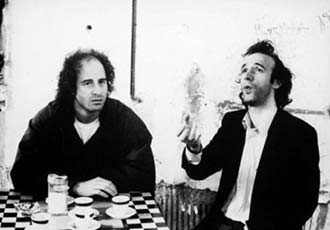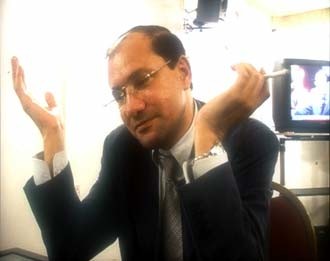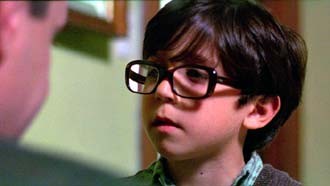|
New Reviews
Coffee and Cigarettes Dir. and writ. Jim Jarmusch; feat. Roberto Benigni, Steven Wright, Joie Lee, Cinqué Lee, Iggy Pop, Tom Waits, Cate Blanchett, Jack White, Meg White, Alfred Molina, Steve Coogan, GZA, RZA, Bill Murray.
Then again, this contrast could be intentional. Jarmusch's inert, intimate direction places the viewer directly in the middle of a conversation. Although we cannot interact with the people on the screen we are nonetheless privy to their fears and fantasies, their doubts and insecurities, their worries and whining. We experience the uncomfortable silences and awkward pauses as they do, yet - consistent with this voyeuristic feeling - we're unable to cross that threshold and become full participants (even as Jarmusch invites us to do so with the inclusion of an extra cup of coffee or an empty chair, both waiting to be filled.) While the conversations verge on the mundane, the larger-than-life characters are nothing but. By having these actors and musicians play themselves - or an alter-ego approximate of their public persona - using a script ripe with the appearance of improv - he reminds us how improbable the odds are of any of us ever discussing alternative medicines alongside Wu-Tang rappers RZA and GZA (while being served by a hyperkinetic Bill Murray); or encountering Tom Waits and Iggy Pop in a deliberately understated game of one-upmanship at our favorite watering hole. Jarmusch's running themes of interconnectedness and isolation resonate throughout the film, as in "Cousins?", set around a teatime talk between Alfred Molina and Steve Coogan. Initially Coogan feigns interest in Molina's purpose for meeting - the two share a distant relation, the genial Spaniard has discovered - but soon gives up on the pretense. Coogan elevates avoidance to an art form as he fumbles for excuses not to give Molina his home number, and takes greater interest in a passing fan's autograph request than in his primo's genealogical research. Meanwhile, Molina's mood changes from elation to disappointment; his downcast eyes convey the heartbreak familiar to anyone who's had a friendship or relationship go sour. Conversation, over coffee and cigarettes or around the dinner table, can bring us together. But, Jarmusch reminds us, the inability to communicate can just as easily split us apart. — Alejandro Pérez
Control Room Dir. Jehane Noujaim (NR) The attention of left-leaning Americans (and the Republican strategists who would like to squash them) is fixed on Fahrenheit 9/11 at the moment, and rightly so. But F 9/11, however effective it is, is largely concerned with things we already know about our President and his war. Control Room, on the other hand, which doesn't have the mighty mouths of Michael Moore and Harvey Weinstein to promote it, presents an idea that very few Americans have paused to consider: That the Al Jazeera network, long denounced by our government as a tool of the enemy, may be a more impartial source of news than some of America's leading media outlets. (As evidence, Al Jazeera is sometimes viewed in the Arab world as being on our side.)
The film, by Jehane Noujaim (who cut her teeth with renowned American documentarians D.A. Pennebaker and Chris Hegedus), introduces us to executives and journalists working for Al Jazeera. Viewers who have imagined the network's employees as brainwashed stooges for Osama bin Laden may be surprised: Of the two individuals who get the most screen time, one - the rotund, urbane Hassan Ibrahim - came to Al Jazeera from the BBC, and the other - chain-smoking, skeptical Sameer Khader - makes no secret of his dream to send his children to America, away from his "Arab nightmare." These are hardly the America-haters depicted by George Bush and Donald Rumsfeld. In a moment that may produce lumps in many viewers' throats, Ibrahim declares an optimism about our country that we occasionally have a hard time sharing: He is confident that the assault on the Arab world will end, he says, because he has "absolute faith in the American Constitution and the American people," and their ability to end a war if they learn it is unjust. That last bit, of course, is a sticking point for the many Americans who believe what their government tells them about Iraq. Control Room shows just how manipulated some of that news is, presenting a different angle (literally, with video footage not aired on these shores) on iconic events such as the fall of Baghdad and the toppling of Saddam Hussein's statue. It lets Al Jazeera defend its use of graphic footage of civilian casualties, and shows a frustrated American press corps stationed at CentCom, that sometimes seems to want to show its viewers more than the government will allow. There is fodder in the film for hours' worth of conversation and debate, much more material than can be touched on here. The film's most valuable contribution, though, is its informed portrayal of journalists who, until now, have been painted in the most one-dimensional way. — John DeFore
Spider-Man 2 Dir. Sam Raimi; writ. Alvin Sargent; feat. Tobey Maguire, Kirsten Dunst, James Franco, Alfred Molina, Rosemary Harris, J.K. Simmons (PG-13) Things get really, really bad for Spider-Man's alter ego in this second installment of the blockbuster franchise - and that's good news for those of us who hoped Sam Raimi could once again bring life to the clichéd world of comic book movies. Peter Parker (Maguire) is destitute and living in a dump, while the love of his life, Mary Jane (Dunst), becomes engaged to a muscular astronaut who happens to be his boss' son. (Peter, you'll remember, can't pursue MJ because superhero girlfriends tend to become magnets for danger.) He's about to flunk out of college and lose his job, his best friend wants Spider-Man dead, and at one particularly dark moment, even his beloved Aunt May pulls away from him.
All of this angst provides the backdrop for the arrival of a new villain, Doctor Octopus, played with unimpeachable cool by Alfred Molina. Doc Ock wears robotic tentacles that have taken control of his genius; they hover about him like devilish serpents, and in one brilliant scene (employing the comic horror sensibility Raimi honed in the Evil Dead trilogy) they wreak havoc on an operating room where doctors are trying to cut them off. Ock has built a device that threatens Manhattan, of course, but the film's real conflict is between Peter Parker and Spider-Man. As Superman once did, Parker longs to be a private citizen concerned only with his own life and love. Raimi drenches the plot in remorse and self-doubt; almost every character here, at some point, has eyes filled with tears. The dialogue is, intentionally, as one-dimensional as a comic book page, but the emotional thrust is compelling - and enough to bring real weight to the tale's action scenes, which are much more thrilling than those in the first film. The combination is especially effective in a scene where the Spidey saves a group of bystanders who, in turn, save him. It's enough to make you believe in heroes again, which is the highest compliment one can pay to a comic book or a movie based on one. — John DeFore
Valentín Writ. & dir. Alejandro Agresti; feat. Rodrigo Noya, Carmen Maura, Mex Urtizberea, Alejandro Agresti, Julieta Cardinali (PG-13) It is risky, especially for a novice writer-director, to make a film with voice-over narration from beginning to end. Audiences expect more from movies than illustrated lectures. And making the main character and narrator an 8-year-old compounds the odds against a warm reception. Though still in the third grade, Valentín himself understands the value of taking a chance. "All in all," he concludes, "life's a crap shoot." If the rest of the script were as precociously sententious as that, Valentín - and Valentín - would be insufferable. What, after all, does a child barely out of diapers know about craps, or life? For the most part, however, director Alejandro Agresti refrains from feeding Valentín metaphors and maxims that even a preternaturally clever youngster could not swallow. Rodrigo Noya's Valentín is a lonely, sensitive boy with big black glasses covering big crossed eyes. He struggles to find his place in a universe indifferent to his aspirations. Valentín longs to be an astronaut, though he recognizes that American or Russian citizenship is a prerequisite to landing on the moon. "Maybe when I'm old enough, Argentina will build rockets as well," he says.
Like some of the best Iranian films, Valentín uses a child's-eye view to offer subtle glances at larger social themes. In church on Sunday, the boy hears a sermon about the recently deceased Che Guevara. Several parishioners walk out as the priest praises Che, an idealistic Argentine expatriate who rejected the comforts of a privileged life. The film ends weeks before Neil Armstrong beats Valentín in his race to become the first human being on the moon. It is a few years before the 1976 coup that began Argentina's "dirty war," in which a junta killed tens of thousands of innocent victims. A disproportionate percentage were Jews, and when Valentín's grandmother disparages his missing mother as "an ungrateful Jew," a viewer is cued to ponder Argentina's dismal history of violent anti-Semitism. "Is it good to be Jewish?" Valentin asks Rufo, himself a Jew who has no answer. It is definitely good to make spunky films that defy Argentina's economic and moral collapse. — Steven G. Kellman
Twilight Samurai (Tasogare Seibei) Dir. Yoji Yamada; writ. Yoji Yamada, Yoshitaka Asama, based on stories by Shuuhei Fujisawa; feat. Hiroyuki Sanada, Rie Miyazawa, Min Tanaka, Nenji Kobayashi, Ren Osugi (NR) Seibei Iguchi's colleagues call him "Twilight" because at the end of the day, when they go off to carouse at a nearby inn, he hurries home to care for his two young daughters and his senile mother. A low-ranking samurai assigned to clerical duties in the storehouse of the Unasaka clan, Iguchi (Sanada) is a widower deeply in debt - and in doubt of his personal worth. Lest he handicap her through union with a social inferior, he turns down the chance to marry Tomoe (Miyazawa), the woman whom he loves and who loves him. Set at the end of the feudal Edo period in the bleak Shonai province of northeastern Japan, where corpses of peasants clutter the icy river, Twilight Samurai is the portrait of a decent man whose impoverished family means more to him than the antiquated codes of swordsman chivalry. After he reveals impressive martial skills fending off a drunken knight (Osugi), Iguchi, who has sold his sword and prefers a wooden stick to more lethal weapons, is ordered to slay a fierce, rebellious warrior (Tanaka). The film is narrated by his youngest daughter, who idolizes her father not least because, defying sexist customs of the time, he encourages his girls to be educated. Like American Westerns, with which they are often interchangeable (e.g., The Magnificent Seven and The Seven Samurai), samurai movies adhere to strict, familiar conventions. And by the turn of the 21st century, both genres seem to have exhausted every possibility, even parody. Like The Gunfighter and Open Range, Twilight Samurai belongs to the elegiac phase of the species. It is Die Samuraidammerung, the twilight of the samurai, when, in the middle of the 19th century, the old social order is disintegrating and knights in arms have begun to lose their purpose. The events of Twilight Samurai are almost exactly contemporaneous with those of The Last Samurai, but director Yoji Yamada has created an intimate psychological study instead of a vast and violent spectacle. "If you have the power to think," Igushi advises his oldest daughter, "you'll always survive somehow." Though it becomes a bit too pensive in a rambling monologue toward the end, Twilight Samurai illustrates how to keep its genre alive, by curbing the carnage and cultivating its powers of thought. — Steven G. Kellman
|





